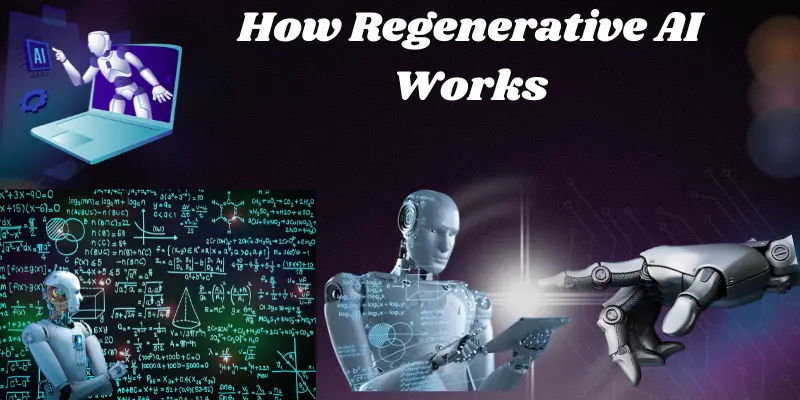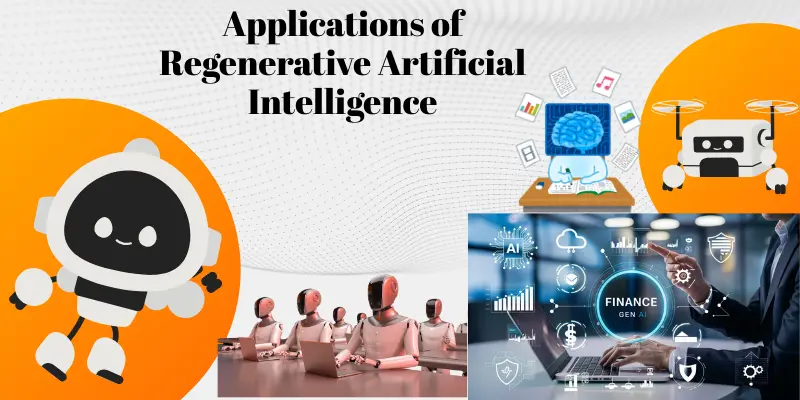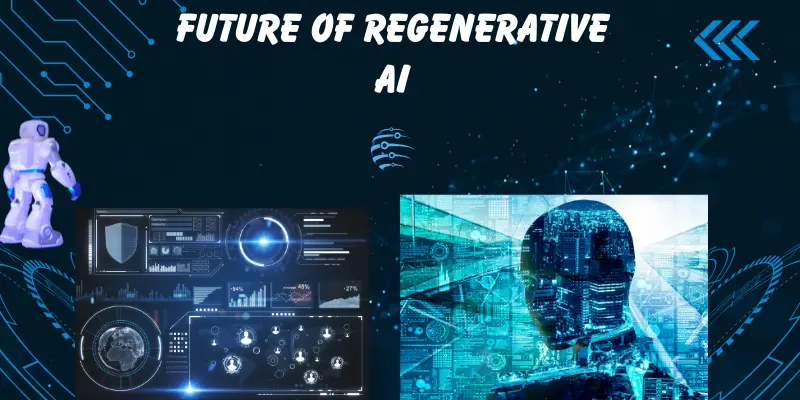Regenerative Artificial Intelligence – Changing the Future
Published: 03/04/2025
Regenerative AI is a new and advanced type of artificial intelligence. It can learn, improve, and fix itself without human help. This means that over time, it becomes smarter and more powerful. Unlike normal AI, which follows fixed rules, Regenerative Artificial Intelligence can change and grow by itself.
AI Regenerative systems work like the human brain. They study past mistakes and create better solutions for the future. This makes them useful in many fields, such as healthcare, business, and education.
People often compare Generative AI vs Analytical AI, but regenerative AI is different. It does not just create new things like Generative AI or analyze data like Analytical AI. Instead, it improves itself to solve problems better over time.
As technology grows, Regenerate AI will play a big role in the future. It will help machines think and act more like humans.
Table of Contents
How Regenerative AI Works
AI Regenerative systems work like a smart student. They learn from their mistakes, fix errors, and improve with time. Unlike normal AI, which only follows instructions, Regenerative Artificial Intelligence can change itself to perform better.

This process happens in three main steps:
- Learning from Data
- Regenerative AI collects information from different sources. It studies past mistakes and finds better ways to solve problems.
- Self-Improvement
- After learning, AI Regenerate systems update themselves. They improve their decision-making without human help.
- Adapting to New Situations
- Regen AI does not just follow old rules. It changes based on new challenges. This makes it smarter and more useful over time.
This technology is very powerful because it helps AI grow like a human brain. Generative AI vs Analytical AI shows different types of AI, but Regenerative AI is unique because it keeps evolving on its own.
Generative AI vs Analytical AI
Artificial intelligence has different types, and two important ones are Generative AI and Analytical AI. People often ask, “What is the difference between Generative AI and AI?” The answer is simple: both have different jobs.
1. Generative AI
- Generative AI creates new content like text, images, and music.
- It learns from data and makes something new.
- Examples: Chatbots, AI art creators, and content generators.
2. Analytical AI
- Analytical AI studies information and finds patterns.
- It helps in decision-making by analyzing large amounts of data.
- Examples: Fraud detection in banks, medical diagnosis, and business predictions.
Key Differences
| Feature | Generative AI | Analytical AI |
| Purpose | Creates new content | Studies and analyzes data |
| Example | AI writing tools, image generators | AI in healthcare, finance, security |
| Learning | Learns from patterns to generate content | Learns to make better decisions |
Both AI types are useful, but Regenerative AI is different. It combines learning, creativity, and problem-solving. Regen AI can improve itself over time, making it smarter and more powerful than both Generative AI and Analytical AI.
Applications of Regenerative Artificial Intelligence
Regenerative AI is a powerful technology that can improve itself over time. This makes it useful in many industries. Here are some important applications of AI Regenerative:

- Healthcare
- Regenerative Artificial Intelligence helps doctors find diseases early.
- It improves medical treatments by learning from patient data.
- AI can also help in making new medicines faster.
- Finance
- AI Regenerate systems detect fraud in banking.
- They analyze stock market trends and help investors make better decisions.
- Regen AI improves online security by learning new threats.
- Education
- AI can create personalized learning programs for students.
- It helps teachers by grading tests and giving smart suggestions.
- Regenerative AI can also assist students in learning new skills.
- Business and Marketing
- AI improves customer service with chatbots that learn and respond better over time.
- It helps companies understand what customers want.
- Generative AI vs Analytical AI shows that both types help businesses, but Regenerative AI is better because it keeps improving.
- Cybersecurity
- Regenerate AI protects websites from hackers by learning new attack methods.
- It helps companies keep their data safe.
- AI can detect and stop security threats in real time.
In the coming years, AI Regenerative will change the world. It will make industries smarter, faster, and more efficient. As technology improves, Regenerative AI will become an important part of our daily lives.
Challenges and Risks of Regenerative Artificial Intelligence
Regenerative AI is an amazing technology, but it comes with some challenges and risks. Here are some of the important issues that need to be considered:
- Ethical Concerns
- As Regenerative AI gets smarter, it might make decisions on its own without human control.
- This can lead to problems if AI makes decisions that are unfair or harmful.
- It is important to make sure AI systems follow ethical rules and values to avoid mistakes.
- Data Privacy
- AI Regenerative systems need a lot of data to learn and improve.
- This data can be sensitive, like personal health or financial information.
- If the data is not protected properly, it can be stolen or misused.
- Misuse of AI
- Some people might use Regenerate AI for bad purposes, like creating fake news or harming others.
- It’s important to have strong rules and regulations to prevent this from happening.
- AI can also be used for cyber attacks, so we must make sure it is not used in harmful ways.
- Job Loss
- As Regenerative AI improves, it can take over tasks that humans do, like customer service or even some types of work in healthcare.
- This can lead to job losses, which can be difficult for many people.
- It’s important to make sure AI is used to help humans, not replace them entirely.
- Technology Dependence
- AI Regenerative systems can be very helpful, but they also make us more dependent on technology.
- If something goes wrong with AI, it can cause big problems.
- It’s important to keep humans in control and not rely on AI too much.
While Regenerative AI offers many benefits, we need to be careful about how we use it. By solving these challenges, we can make sure that AI works for the good of everyone.
Future of Regenerative AI
The future of Regenerative AI is very exciting. As technology keeps getting better, Regenerative AI will become smarter and more useful in many areas of life. Here’s what we can expect in the future:

- Smarter Machines
- AI Regenerative systems will learn faster and become more intelligent.
- They will solve complex problems that are difficult for humans to handle.
- Machines will think and adapt on their own, making them more efficient and effective.
- Helping in New Industries
- Regenerative AI will help in fields we haven’t even imagined yet.
- It will be used in space exploration, environmental protection, and even in making new discoveries about the human brain.
- This technology will open up new possibilities that can change the world.
- Improved Healthcare
- AI Regenerative will make healthcare even better.
- It will help doctors detect diseases early and suggest the best treatments.
- AI could also help in creating personalized medicine that works best for each person.
- Better Education
- Regenerative AI will make learning more fun and effective.
- AI will create lessons based on each student’s needs, helping them learn at their own pace.
- It will also help teachers by providing smart tools to make education better.
- Safer and Smarter Cities
- AI will help make cities safer by improving traffic systems, reducing pollution, and managing resources more efficiently.
- Regenerative AI will also make transportation smarter, like self-driving cars and faster public transport.
- Ethical and Responsible Use
- As Regenerative AI grows, people will need to make sure it is used responsibly.
- There will be stronger rules to ensure that AI is safe and fair for everyone.
- Governments, companies, and experts will work together to make sure AI helps people in the right way.
The future of Regenerative AI is full of exciting opportunities. It will change many parts of our lives, making things easier, smarter, and more efficient. If we use it the right way, Regenerative AI will bring a positive impact to the world.
Advantages and Disadvantages of Regenerative Artificial Intelligence
Regenerative AI has many benefits, but there are also some challenges we need to think about.
Benefits of Regenerative Artificial Intelligence
Regenerative Artificial Intelligence offers many benefits, such as faster problem-solving, continuous improvement, and smarter decision-making, making our lives easier.
| Pros |
|---|
|
Drawbacks of Regenerative Artificial Intelligence
While Regenerative AI brings many benefits, it also has some drawbacks. These include ethical concerns, privacy issues, and the potential to replace human jobs.
| Cons |
|---|
|
Common FAQs about Regenerative AI
Regenerative AI is a powerful technology that learns and improves over time. In this section, we answer the most common questions about it.
Regenerative AI is a type of artificial intelligence that can improve itself by learning from experience. It adapts and gets better over time without needing human help.
Regenerative AI works by collecting data, learning from it, and then improving itself. It uses this information to make better decisions and solve problems more efficiently.
Generative AI creates new content, like text or images, while Regenerative AI focuses on improving itself to solve problems better. Regenerative AI can adapt to new challenges and grow smarter, while Generative AI mainly creates things from what it already knows.
Some advantages of Regenerative AI include faster problem-solving, continuous self-improvement, better decision-making, and the ability to create personalized experiences for users.
Yes, there are some risks, such as data privacy concerns, job loss, misuse of AI, and ethical issues. It is important to make sure that AI is used responsibly and safely.
Yes, Regenerative AI can be very helpful in healthcare. It can help doctors diagnose diseases faster, recommend treatments, and even create new medicines.
While Regenerative AI may replace some jobs, it will also create new opportunities. People will need to learn new skills to work with AI, and it can also help improve jobs in many industries.
To ensure Regenerative AI is used safely, we need to create strong rules and ethical guidelines. These rules will help prevent misuse and protect privacy.
The future of Regenerative AI is exciting! It will continue to grow smarter and will be used in many industries like healthcare, education, business, and more. It will help solve complex problems and improve our lives.
No, Regenerative AI and Analytical AI are different. Analytical AI focuses on studying data to make decisions, while Regenerative AI learns from data and improves itself over time.
Conclusion
Regenerative AI is a very exciting and powerful technology that can help solve many problems. It learns from its mistakes and keeps improving over time, making it smarter and better at what it does.
In the future, Regenerative AI will be used in many areas like healthcare, education, business, and more. It will help doctors find diseases faster, make learning easier, and even create smarter cities.
While Regenerative AI has many benefits, it also comes with risks, such as data privacy issues and the potential for job loss. That’s why it’s important to use it safely and responsibly, following rules and guidelines to protect people.
Regenerative AI will change the way we live and work. If used correctly, it will improve our lives and create new opportunities for everyone.

- Be Respectful
- Stay Relevant
- Stay Positive
- True Feedback
- Encourage Discussion
- Avoid Spamming
- No Fake News
- Don't Copy-Paste
- No Personal Attacks

- Be Respectful
- Stay Relevant
- Stay Positive
- True Feedback
- Encourage Discussion
- Avoid Spamming
- No Fake News
- Don't Copy-Paste
- No Personal Attacks





